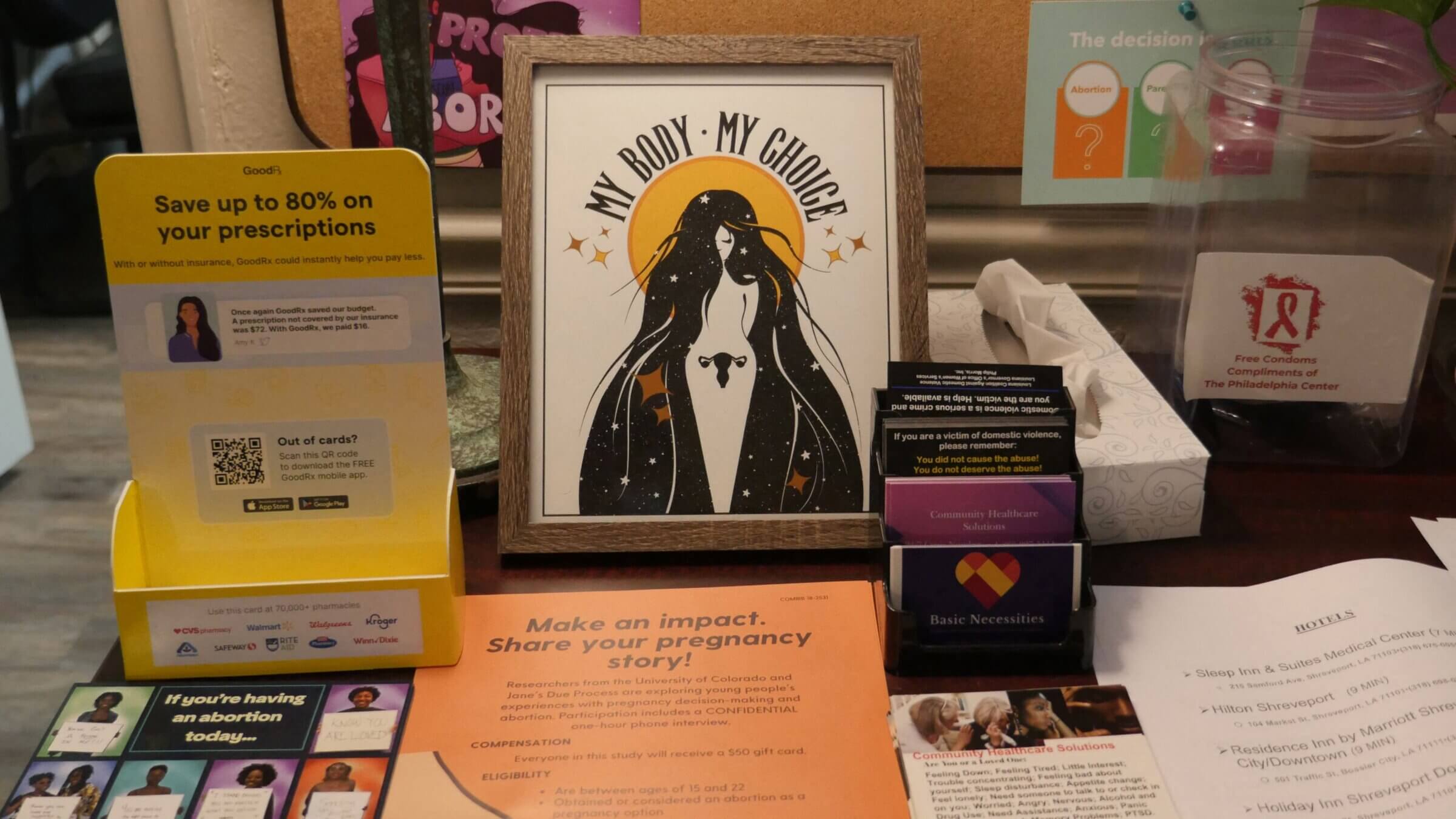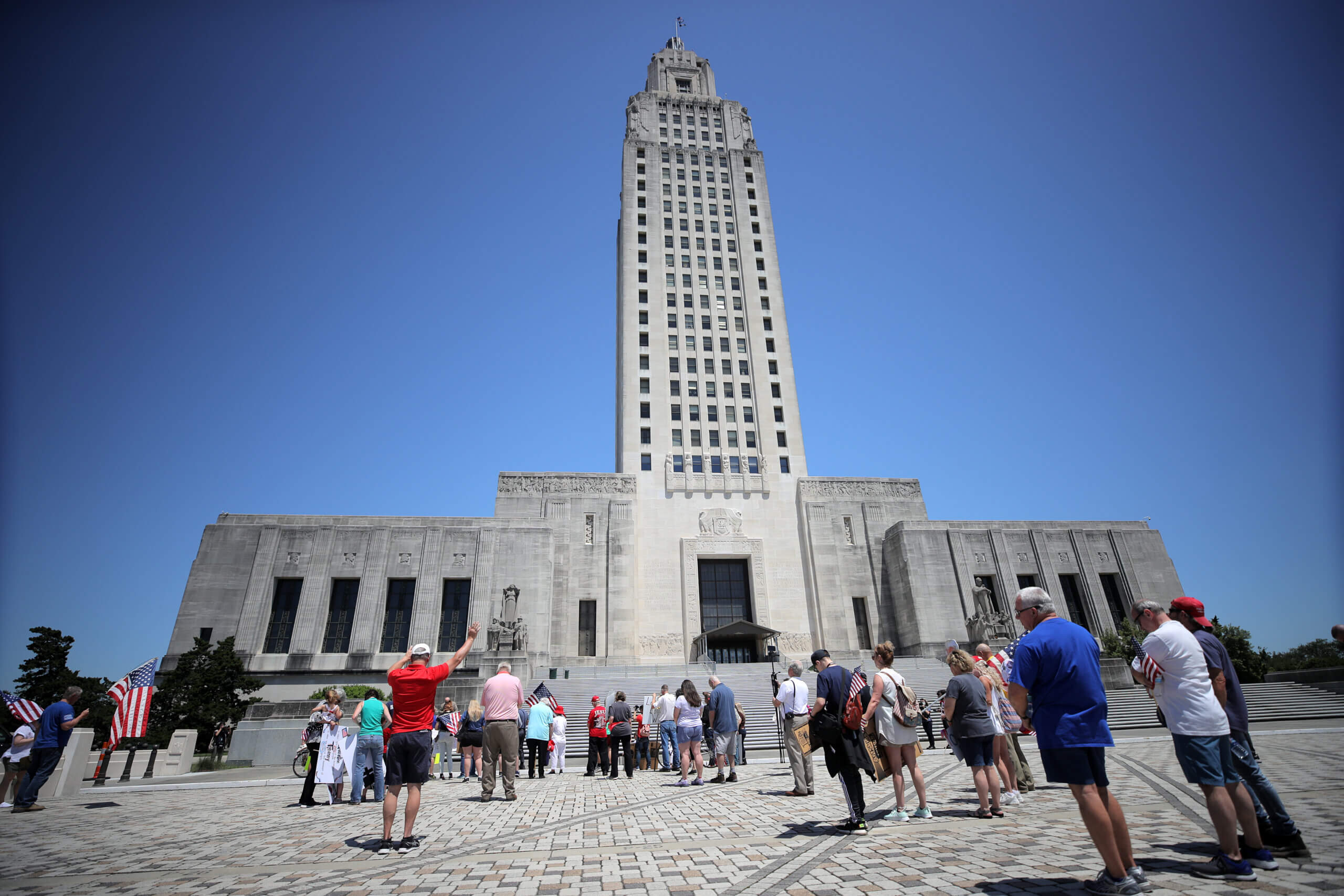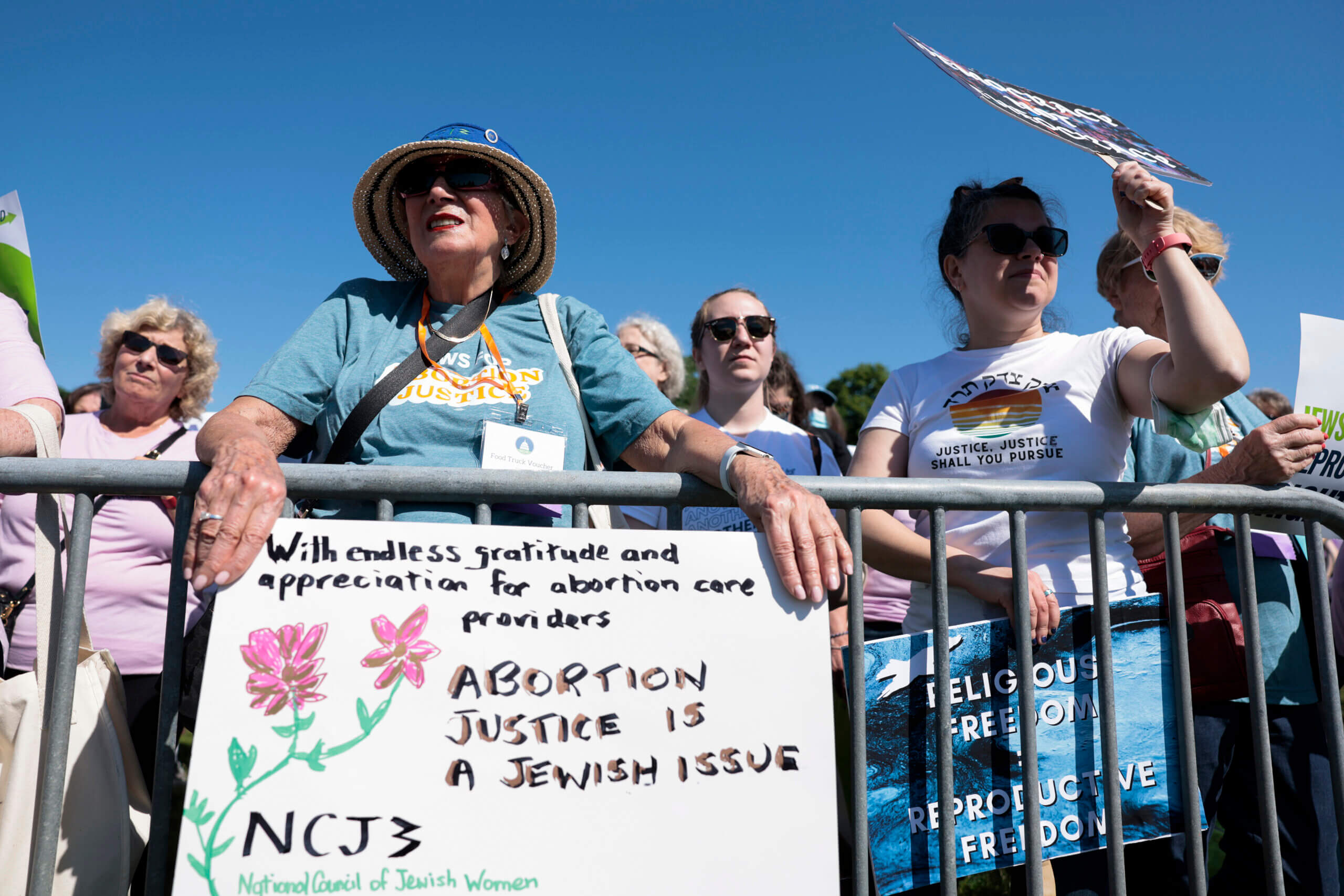This rabbi made the religious case for abortion 30 years ago — it didn’t go well.
Rabbi Robert Loewy argued banning abortion violated religious freedom in 1990, before it was a popular take on the issue

Information is displayed on a table at the Hope Medical Group for Women in Shreveport, Louisiana in April. When the state legislature sought to ban abortion in 1990, Rabbi Robert Loewy told lawmakers that doing so would violate the religious freedom of Jews. Photo by Getty Images
Jews, Loewy explained to a House committee, do not believe that life begins at conception as the bill’s sponsor had claimed, but that a fetus gradually acquires more rights as it develops.

“There is a moral and ethical basis for a woman to undergo an abortion,” Loewy told legislators.
J.J. Goldberg, a former editor of the Forward, recounted the episode in his 1994 book “Jewish Power,” and described it as a watershed moment in the community’s abortion advocacy.
“The case for abortion as a matter of Jewish religious freedom is a powerful one,” Goldberg wrote. “But it had never before been made in a public forum.”
The argument could become the next legal frontier, as Jews and Jewish groups make the case that bans and restrictions on abortion violate their First Amendment right to freely exercise their faith. The approach gained traction in early May after Politico published a leaked Supreme Court decision striking down Roe, which in 1973 established a constitutional right to abortion. The court’s 6-3 ruling eviscerated that right.
At the Jewish Rally for Abortion Justice in May, speaker after speaker invoked the Jewish imperative to abortion in cases where the mother’s health was at risk. “Whose religious freedom are you trying to protect?” Sheila Katz, chief of the National Council of Jewish Women, asked of those who are seeking to outlaw abortion. “Not ours.”
A synagogue in south Florida earlier this month sued to block legislation that would ban abortions after 15 weeks, arguing that it violated the state constitution’s right to freedom of religion.
Rabbi Barry Silver brought the lawsuit on behalf of Congregation L’Dor Va-Dor, which he leads, and said that his goal was not just to send a message but to carve out protections for Jews in states where abortion is outlawed.
“It’s not just to make a point or something,” Silver said in an interview. “It’s deadly serious.”
But Loewy’s experience appealing to conservatives who sought to ban abortion 32 years ago may be instructive for the Jewish leaders making the same argument today.
The ‘rabbi roast’

Though Loewy’s synagogue, Congregation Gates of Prayer, was located near the liberal bubble of New Orleans, it sits in a conservative Congressional district that better reflects the rest of the state. At the time he testified on the abortion bill, his state representative was David Duke, the former grand wizard of the Klu Klux Klan.
Well aware of the legislature’s conservative nature — especially on abortion — Loewy still thought his testimony might persuade some lawmakers by using language they could understand.
“I was actually trying to say, if you believe it’s important to have religion in the public sphere you need to listen to one of the oldest religions,” Loewy recounted in an interview this week. “Probably naively I thought it would have an influence on votes.”
Loewy, by most accounts, did not.
Rep. Louis “Woody” Jenkins, who was sponsoring the measure, mocked Loewy’s testimony about the Jewish tradition that babies who die before eight days should not receive a funeral.
“We just heard from one crazy religion that doesn’t even think babies are people after they’re born,” Jenkins told reporters after the hearing.
When Loewy returned to the capitol a few days later to speak to another committee, lawmakers were prepared. Sen. Mike Cross — “the irony of his name was not lost on me,” Loewy said — interrupted the rabbi to ask if Judaism also permitted marijuana use and prostitution.
Loewy said that the Torah did not consider killing a fetus to be murder and tried to cite Exodus 21:22.
“That’s not in my Bible,” Cross snapped.
The incident became known as the “rabbi roast,” a term coined by a reporter at the time. The community backed off the religious argument, figuring that the reaction from hostile lawmakers was motivated by ignorance and intolerance of advocates for abortion rights — not of Jews qua Jews.
Goldberg described local Jews as chastened by the reaction to the religious pitch for abortion access. “In framing the bill as an assault on their religious freedom,” he wrote, “the Jewish community’s leaders may have gone one step too far.”
“They were holding up Jewish rights as a shield for a separate issue, on the assumption that their opponents had too much respect for religious freedom, and for Jews, to press the attack,” Goldberg recounted. “As they found out, that was a mistake.”
Loewy said that his days testifying against the bill, which passed the legislature but would eventually be vetoed by the governor, would represent the high-water mark of his advocacy on the issue. The fierce backlash to his argument aside, abortion rights was a losing issue in a state with a huge base of conservative voters and the strong influence of the Catholic Church, which is opposed to birth control and abortion.
“There are some fights that are just not worth having,” Loewy said.
‘A different faith narrative’

While Loewy’s approach may not have resonated in Louisiana in 1990, other Jewish leaders remain optimistic that the religious case for abortion rights is a compelling one. After NCJW sent hundreds of rabbis to lobby Congress earlier this year in support of a bill that would protect access to abortion nationally, Katz said that the legislation picked up 36 new sponsors.
“It really showed us that there was power in rabbis and spiritual leaders and faith leaders showing up to say this was a religious freedom issue,” Katz said. Her organization is also considering legal challenges to abortion bans and said that women who are impacted by those laws could reach out to NCJW.
While Katz emphasized the importance of challenging the idea that religion is anti-abortion, the legal question of whether outlawing abortion violates the religious freedom of Jews remains an open question.
Josh Blackman, a conservative constitutional scholar, wrote a blog post Monday arguing that liberal Jews, like those who belong to Silver’s Florida synagogue, have a weak legal case when it comes to abortion because they do not follow other forms of halacha, or Jewish law.
“If virtually every other facet of halacha is not binding on members of this congregation, how could it be that this one teaching on abortion is binding — so binding, that a state’s prohibition of that teaching actually substantially burdens the free exercise of religion?” Blackman wrote.
Blackman’s blog post made waves on social media. Rabbi David Saperstein, a longtime leader in the Reform movement who spent decades working on religious freedom issues, said it missed a key point. The law typically requires only that a plaintiff’s beliefs are sincere — meaning judges would be unlikely to parse the difference between Reform and Orthodox Jews.
Saperstein said the larger challenge for Jews suing over abortion bans would be that the government could successfully argue that it had a legitimate societal interest in passing these laws that even sincere religious beliefs cannot override. This is similar to the reason why laws prohibiting child marriage have been upheld, despite some religions that encourage it.
Ironically, another potential victory for religious conservatives might open the door to a Jewish abortion exemption. Several Supreme Court justices appear willing to strike down a vaccine mandate in New York State that allows medical exemptions but bans religious ones, Saperstein noted. While Jews have historically opposed such religious carve outs, they may now turn to that line of argument in legal battles over abortion.
“If you allow exemptions for anything you should allow it for people who have a legitimate religious claim,” Saperstein said, “and here the Jewish claim would be very strong.”






















